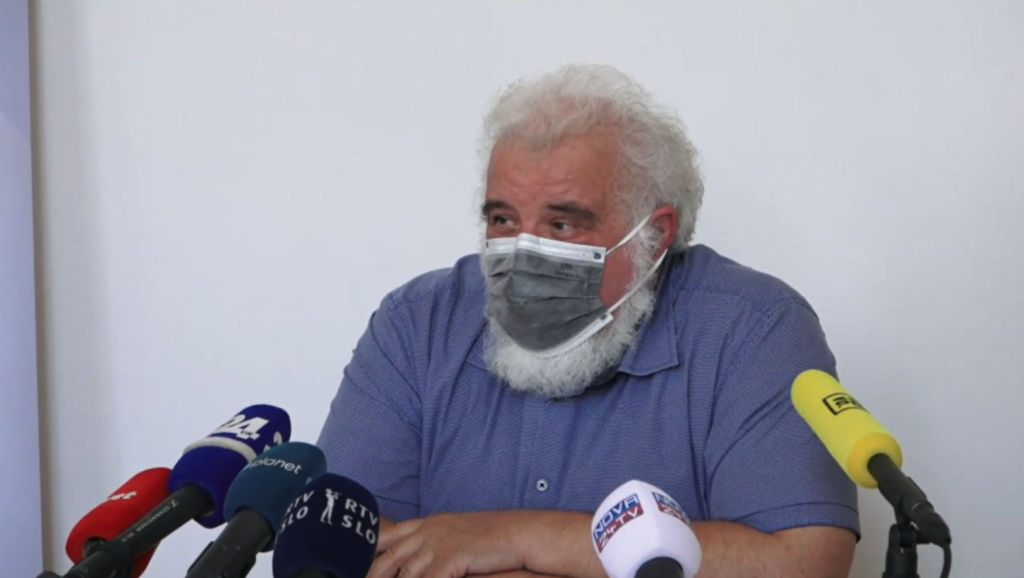According to NIJZ director Milan Krek we recorded slightly fewer new infections on Tuesday (5076), but this does not mean that the outbreak of the epidemic is calming down. The Prime Minister Janez Janša and his sons also became infected. Krek pointed out that we will only see the real picture of whether the epidemic is subsiding on Monday or Tuesday, while a version of the omicron 2 virus is already circulating among us. “We have already experienced the peak with omicron 1, and the numbers are calming down a bit. A version of omicron 2 virus is now spreading, and it is not yet clear whether the number of infections will start to decline, or we will see a new peak of infections,” he told us and explained that we still know too little about omicron 2, so it is also not clear how this version will also behave and affect our lives.
Yesterday, 5,076 new coronavirus infections were confirmed with 1,566 PCR tests and 51,036 rapid antigen tests. According to the National Institute of Public Health, there are currently 173,691 cases of active infections in Slovenia, which is 12,387 fewer than the day before. The seven-day average of confirmed cases is currently 9,862, which is 2,710 less than the day before, and the number of confirmed cases in the last 14 days per 100,000 population is 8,239, 588 less than the day before.
According to the director of the National Institute of Public Health (NIJZ) Milan Krek, the number of infections is slowing down, but not to such an extent that in the future there would be as few infections as on the holiday. “We have already confirmed 1,700 infections by 9 am today,” he explained. As he added, on Monday or Tuesday we will be able to know more with certainty where we are in terms of the number of infections. “We have already experienced the peak with omicron 1, and the numbers are calming down a bit. A version of the omicron 2 virus is now spreading, and it is not yet clear whether the number of infections will start to decline or whether we will witness a new peak of infections,” he explained.
There are currently 1,056 patients being treated in hospitals, 548 patients due to covid-19, and 508 patients with covid-19. Of these, 147 are treated in intensive care, 125 due to covid-19 and 22 with covid-19. On Sunday, 18 people died from covid-19. Krek notes that the situation in hospitals is not improving yet, and the advantage of omicron is that we have fewer patients in intensive care than in previous versions. “Given that we still know very little about omicron 2, it is also very difficult to predict what the situation will be in hospitals in the coming months,” Krek said.
It is still too early to expect the calming of the outbreak of the epidemic, and the course of the outbreak will largely depend on the behaviour of omicron 2. “Omicron 2 can be expected to displace omicron 1, but this may be an upgrade. We do not yet know how it will behave,” he explained, adding that there are months ahead when the virus can develop other variants, as there is a not enough vaccinated population around the world and the virus has ideal conditions for its development.
Responses to vaccination in Slovenia are poor
According to the NIJZ, 1,262,083 people have been vaccinated with one dose of the covid-19 vaccine, and 1,213,779 with all doses. According to Krek, the response to vaccination is extremely poor, as we still do not have a sufficiently vaccinated population, but the situation in hospitals certainly shows that vaccination helps to alleviate the disease. “For now, there is also the question of whether we will start vaccination with the 4th dose of the vaccine and who we will vaccinate,” he said, announcing that a booster dose vaccination for adolescents could be launched soon, when the European Medicines Agency (EMA) approves it.
Krek also points out that masks indoors are still mandatory and in open spaces where sufficient interpersonal distance cannot be provided. He also calls for regular ventilation of the premises and warns against a state of emergency in hospitals. “Some health centres and hospitals are already reporting a state of emergency due to sick leave and quarantine. The same is true in the economy, as many workers are out of work due to infection.”
Prime Minister Janez Janša also did not escape the coronavirus. While he pointed out that he successfully avoided the virus for two years, both of his sons tested positive on Tuesday, and his test was still negative at the time, however, today he tested positive to a new coronavirus infection. As he wrote next to a picture of the test he posted on Twitter, he has all the classic symptoms, but they are milder so far.
Sara Rančigaj


